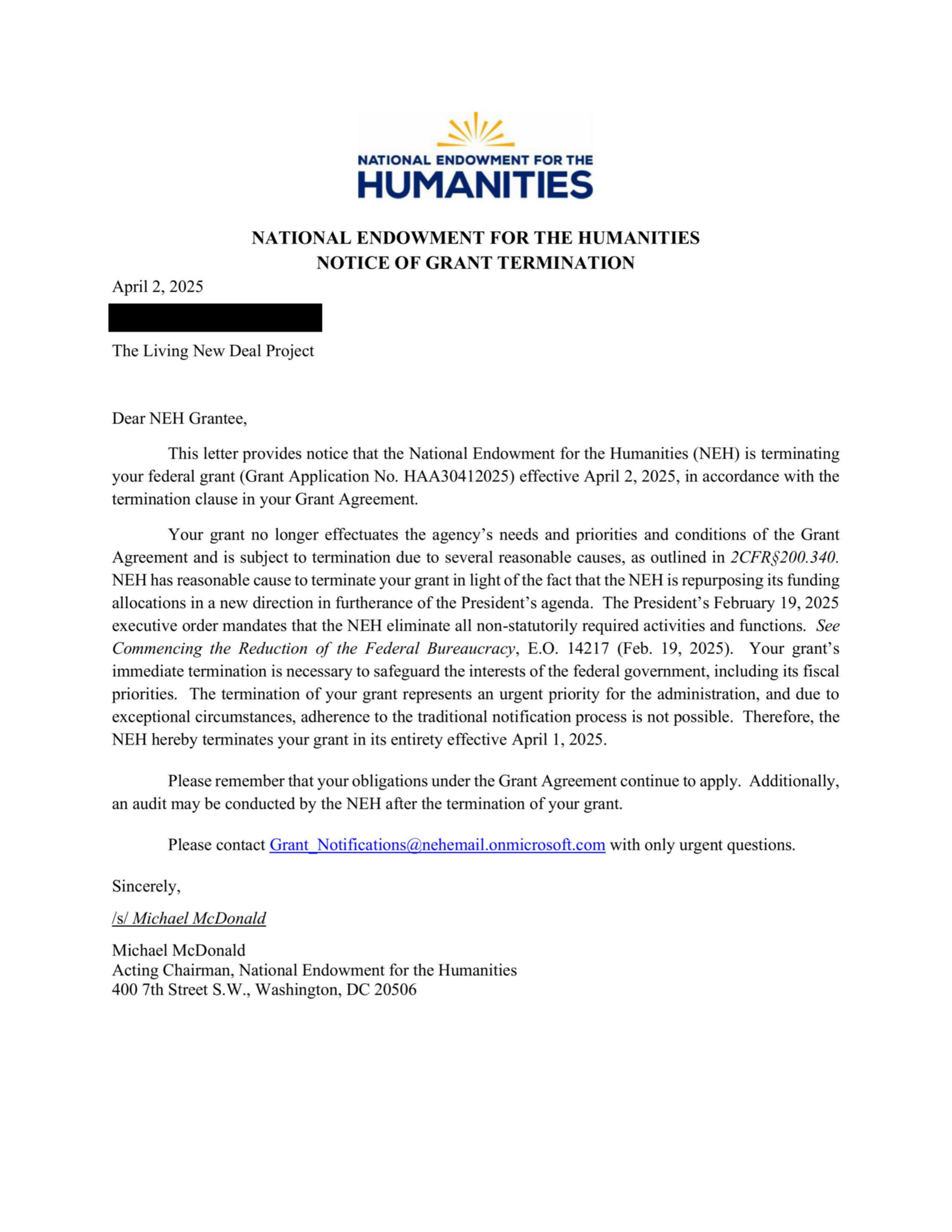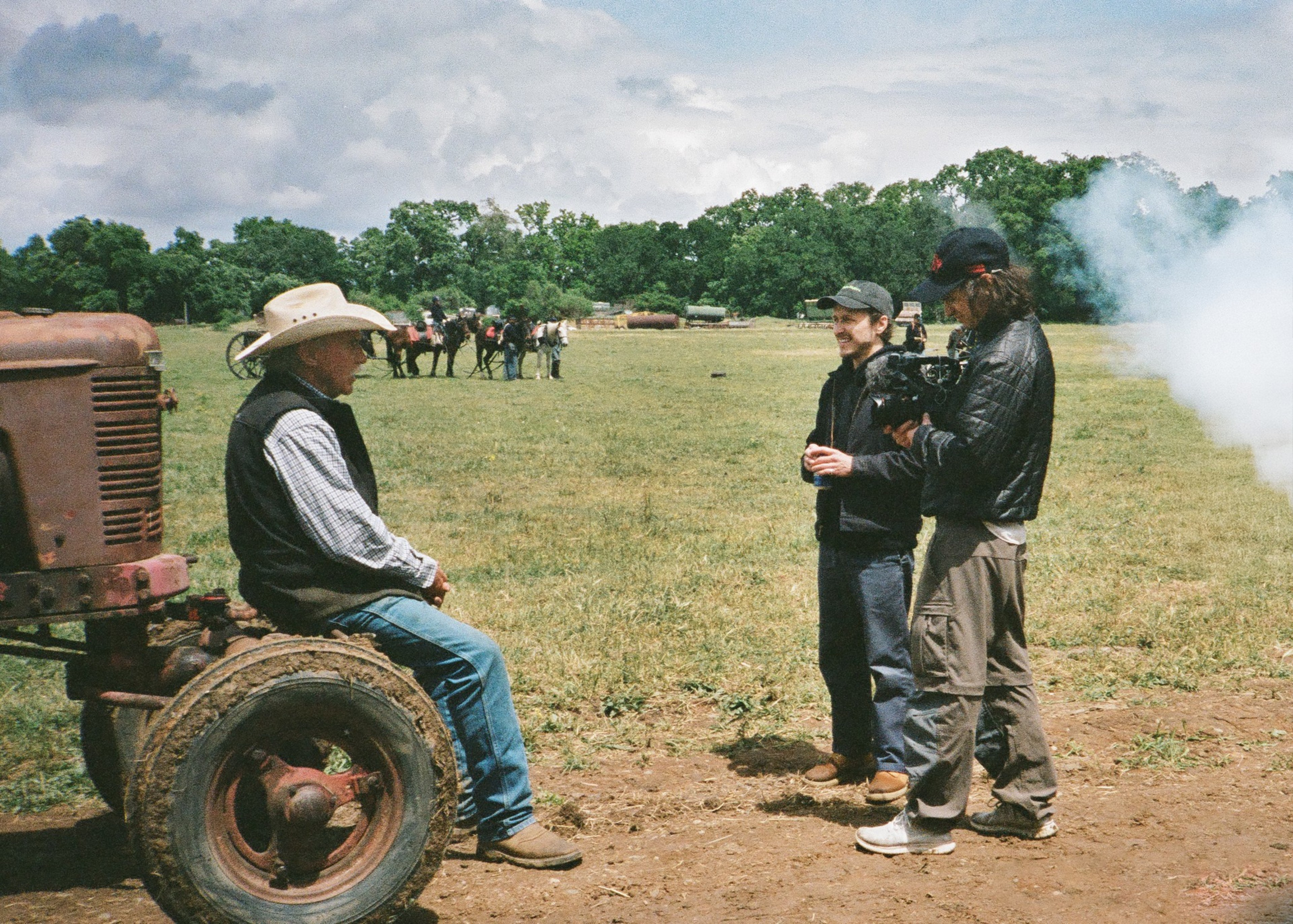Ever since Jacob Kornbluth was a kid, he dreamed of being a filmmaker. The Berkeley documentarian eventually won an Emmy for his TV series, Years of Living Dangerously. For the last three years, Kornbluth has been working on a film about Native Americans in California, which was largely funded by federal grants from the National Endowment for Humanities.
On April 10, in an effort orchestrated by the Elon Musk-led Department of Government Efficiency, a bulk of the NEH staff were placed on leave, and its $290 million budget was frozen. More than 1,000 grants were rescinded — Kornbluth’s among them.
“I have two kids who are in school, and I live in the Bay Area, and this was, you know, how I was going to make it this year,” Kornbluth said. “Now I have to pivot.”
Creatives across California were awarded more than $66 million in NEH grants between 2019 and 2023. Before the cuts, the NEH supported 51 institutions and projects in the Bay Area, with a total of $17.8 million in funding.
All of those grants have been canceled, and any money that was to be paid out after the first week of April has been withheld.
The Bay Area’s huge loss
The cuts affect a range of projects important to Bay Area culture, from an oral history of the elderly Asian American community during the coronavirus pandemic to an initiative to preserve rare LGBTQ posters.
The archivists in charge of preservation at the now-closed San Francisco Art Institute found out that their $234,000 grant — “a real lifesaver” — had been canceled only after checking the grant portal themselves. An SFAI Legacy Foundation and Archive board member who tried to get in touch with the NEH grant officer learned that the officer had been laid off.
“I know other people got emails, but we didn’t get that,” archivist Becky Alexander said.
The archiving duo at the SFAI Legacy Foundation have lost about $56,000 in NEH funds and are in “full-blown fundraising mode” to keep their small operation going.
Mary Okin, assistant director of Living New Deal, a website that documents the artworks of the New Deal period, learned of the termination of her organization’s grant, awarded in December, via email.

“Your grant’s immediate termination is necessary to safeguard the interests of the federal government, including its fiscal priorities,” the emails say.
Of the canceled Bay Area NEH grants, 37 were administered through California Humanities, which was to be awarded $8.6 million between 2022 and 2027 to fund state-based projects. Rick Noguchi, president and CEO of California Humanities, said the program is “unable to fulfill $650,000 in grant commitments.”
Among them is SF’s beloved literary festival Litquake, which won a $25,000 grant to fund its 2024 one-night pub crawl. While it had received smaller NEH grants in the past for the annual Lit Crawl and general operating support during the coronavirus pandemic, this was the organization’s largest award. The group had been reimbursed for the first half of the grant and was scheduled to receive the second portion soon.
Norah Piehl, Litquake’s executive director, said the organization now expects a budget shortfall. For the Lit Crawl in October, the team is looking solely at venues that won’t charge fees and is cutting costs elsewhere, Piehl said.
‘A catastrophic development, if not a death blow’
NEH grants for humanities programs at Stanford, UC Berkeley, Cal Poly Humboldt, St. Mary’s College, UCSF, and UC Davis have also been slashed — as have those at smaller institutions.
The Internet Archive, the SF-headquartered nonprofit best known for its “Wayback Machine” archiving tool, was halfway through an NEH grant of $345,960 when the funding was cut.
That was just the first DOGE-related funding cut to hit the Internet Archive, which has been busy archiving many of the websites the Trump administration has ordered taken down; its 2023 grant for $250,000 from the Institute of Museum and Library Services was cut days later. The organization’s other funding streams will keep it afloat, according to Jefferson Bailey, the director of archiving and data services, but he worries about what will happen to smaller nonprofits.
“This is really going to impact institutions that we take for granted,” Bailey said, “like our museums, our historical societies, our public libraries, our academic libraries — just a lot of people that keep information free and accessible and online.”
For individual grantees, the situation is dire.
“The rescinding of NEH support for filmmakers is a catastrophic development, if not a death blow, for those who, through hard work and merit, have earned their grants,” said Marc Shaffer, a Bay Area-based producer who has received NEH funding in the past and is waiting to find out if he got a grant for his latest film.
“NEH documentaries contribute significantly to American culture,” he said. “They are national treasures deserving of far more support than they receive.”
Shaffer’s NEH-funded film “Exposing Muybridge” won a Writers Guild Award in 2022. Shaffer pointed out that the film was made for the equivalent of one-third of a penny from each U.S. taxpayer. “I daresay Elon Musk would approve,” he said.
‘Full-blown fundraising mode’
Local creatives and institutions have been scrambling, pivoting to crowdfunding campaigns, side grants, and increasingly competitive private support.
It will be especially hard for organizations that don’t neatly fit into easily fundable categories. “We’re not a museum; we’re not a university. We’re kind of, like, adjacent, and it’s hard to apply for funding,” said Okin of Living New Deal. The organization plans to continue with its archiving project, but at a slower pace.
Brandon Tauszik, director of the documentary “Living Harriet Tubman,” which follows the life of a Fresno-based Civil War reenactor, said his team has turned to GoFundMe to make up for the funding cuts.

Tauszik has received $15,000 from a $30,000 grant from California Documentary Project via California Humanities, but the second installment may never materialize.
“If you remove a major source of funding, obviously those who rely on that fund are going to have to turn elsewhere, and it’s going to become more competitive,” Shaffer said. But like other grantees whose federal money has been cut off, he isn’t giving up. “I’m determined. I know that it’s going to be a grueling path to reaching the finish line.”
